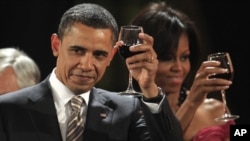Strengthening democracy and respect for human rights and fundamental freedoms is critical to the continued success of the countries of Latin America. As articulated in the Charter of the Organization of American States, founded over 60 years ago, the member nations have declared that "representative democracy is an indispensable condition for the stability, peace and development of the region."
In a speech in Chile during his recent trip to Latin American, President Barack Obama urged countries in the region to "recommit to defending democracy and human rights in our [their] countries by strengthening the institutions that democracy needs to flourish – free and fair elections in which people choose their own leaders; vibrant legislatures that provide oversight; independent judiciaries that uphold the rule of law; a free press that promotes open debate; professional militaries under civilian control; strong civil societies that hold governments accountable; and governments that are transparent and responsive to their citizens. That is what makes a democracy."
"And despite this region's democratic progress, stark inequalities endure. In political and economic power that is too often concentrated in the hands of the few, instead of serving the many. In the corruption that too often still stifles economic growth and development, innovation and entrepreneurship. And in some leaders who cling to bankrupt ideologies to justify their own power and who seek to silence their opponents because those opponents have the audacity to demand their universal rights. These, too, are realities that we must face," said President Obama.
Every nation, said President Obama, will follow its own path to democracy. "No nation," he said, "should impose its will on another. But surely we can agree that democracy is about more than majority rule, that simply holding power does not give a leader the right to suppress the rights of others, and that leaders must maintain power through consent, not coercion. We have to speak out," said President Obama, "when we see those principles violated."
As many countries in Latin American have demonstrated, successful transitions to representative democracy have certain common principles. The moral force of nonviolence; dialogue that’s open and inclusive; the protection of human rights and fundamental freedoms, such as peaceful expression and assembly; accountability for past wrongs; and matching political reform with economic reform.
As stated in the 2001 Inter-American Democratic Charter, "The people of the Americas have a right to democracy and their governments have an obligation to promote and defend it."
Democracy and Human Rights in Latin America

"Representative democracy is an indispensable condition for the stability, peace and development of the region."



